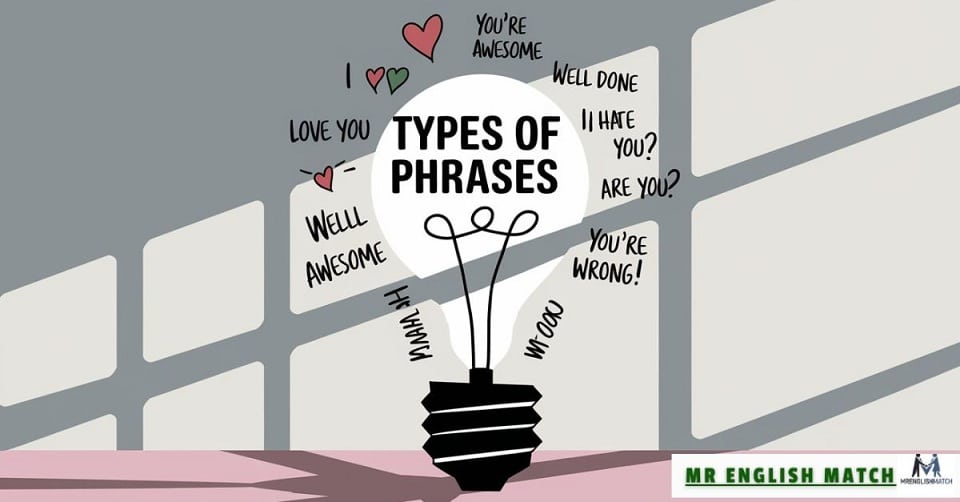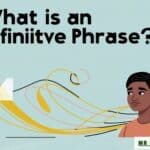What Is a Phrase?
A phrase is a group of words that work together to convey a specific meaning but does not form a complete sentence on its own. Unlike a clause, which have a subject and a verb, a phrase usually lacks either or both. For example, “under the table” is a prepositional phrase that provides context but cannot stand alone. Phrases and types of phrases are essential building blocks in English. They help in depth, detail, and clarity to sentences.
Think about everyday speech. When you say, “at the end of the day,” you’re using a phrase to describe a point in time. This phrase conveys meaning without a complete subject-verb structure. By understanding different types of phrases, you can elevate your communication skills and make your English more expressive and precise.
Common Types of Phrases in English Grammar
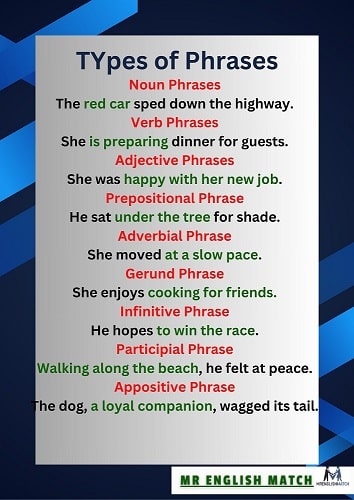
Noun Phrases
Noun phrases serve as the subject, object, or complement in a sentence. They often consist of a noun and its modifiers. Consider the example “the black cat.” Here, “cat” is the noun, while “the” and “black” provide more details. What is a nominal phrase? It simply refers to a noun phrase that centers around a noun as its core element. Using noun phrases makes sentences more descriptive and interesting.
Examples of Noun Phrase
- The red car sped down the highway.
- A bouquet of roses was placed on the table.
- Her bright smile lit up the room.
- The sound of rain calmed the atmosphere.
- Our loyal dog barked at the stranger.
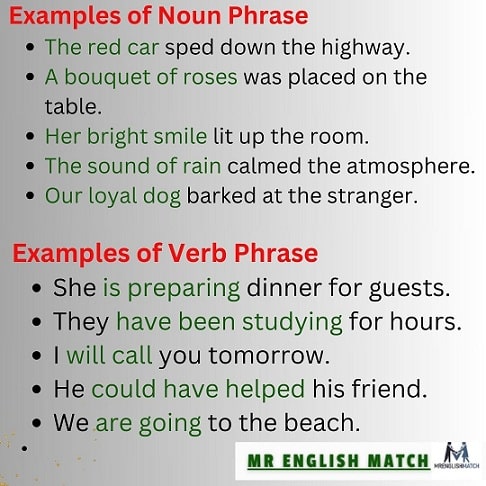
Verb Phrases
Verb phrases consist of the main verb and any auxiliary or helping verbs. They help express actions or states of being more clearly. A verb phrase sample might be, “She is running late.” In this example, “is running” is the verb phrase showing the present continuous tense. Mastering what is a verb phrase allows you to create accurate descriptions of actions and states.
Examples of Verb Phrase
- She is preparing dinner for guests.
- They have been studying for hours.
- I will call you tomorrow.
- He could have helped his friend.
- We are going to the beach.
Adjective Phrases
Adjective phrases modify nouns by adding more detail. In “a cup full of tea,” the phrase “full of tea” acts as an adjective phrase, describing the cup. Adverbial phrases work similarly but modify verbs, adjectives, or other adverbs, providing information about when, where, why, or how an action occurs. Phrases like “with great speed” are used in sentences such as “He ran with great speed.”
Examples of Adjective Phrase
- The cake covered in chocolate was delicious.
- Her dress, made of silk, shimmered beautifully.
- The house painted yellow is theirs.
- She was happy with her new job.
- The man with the blue hat waved at us.
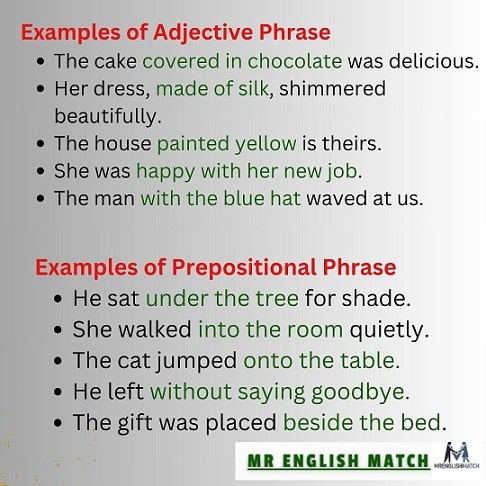
Prepositional Phrase: Preposition + Object
A prepositional phrase begins with a preposition (like “in,” “on,” “at,” “under,” “with,” etc.) and ends with the object of the preposition, which is usually a noun or pronoun. These phrases provide more information about the location, direction, time, or method. For example, in the sentence “The book is on the table,” the phrase specifies where the book is located. Prepositional phrases enhance clarity and give more context to a sentence. Another example is “She walked through the park,” which describes the movement of the subject in relation to a place.
Examples of Prepositional Phrase
- He sat under the tree for shade.
- She walked into the room quietly.
- The cat jumped onto the table.
- He left without saying goodbye.
- The gift was placed beside the bed.
Adverbial Phrase: Modifies Verbs/Adjectives/Adverbs
An adverbial phrase functions like an adverb, modifying a verb, adjective, or another adverb by providing more details about manner, place, time, frequency, or degree. In the example “He ran very quickly,” the adverbial phrase “very quickly” describes how he ran. Adverbial phrases help provide richer and clearer descriptions. Another example is “They left in the morning,” which tells us when they departed.
Examples of Adverbial Phrase
- He spoke with great confidence.
- She moved at a slow pace.
- They arrived just in time.
- The train left in the morning.
- She completed the task with ease.
You might like also:
Usual phrases in English:Daily use of common phrases
Gerund Phrase: Verb Acting as a Noun
A gerund phrase includes a gerund (a verb ending in -ing) and any modifiers or objects that complete its meaning. The entire phrase functions as a noun in a sentence. For example, “Swimming in the ocean is my favorite activity” uses the phrase “swimming in the ocean” as the subject. Gerund phrases can act as subjects, objects, or complements. In “I enjoy reading books at night,” the phrase acts as the object of the verb “enjoy.”
Examples of Gerund Phrase
- Running every morning keeps me healthy.
- She enjoys cooking for friends.
- Swimming in the ocean is refreshing.
- They discussed moving to a new city.
- His favorite activity is reading historical novels.
Infinitive Phrase: “To” + Base Form of a Verb
An infinitive phrase starts with the word “to” followed by the base form of a verb, sometimes accompanied by objects or modifiers. These phrases can function as nouns, adjectives, or adverbs in a sentence. For example, in “She wants to succeed in her career,” the phrase “to succeed in her career” expresses purpose and acts as a noun. Infinitive phrases add meaning and often indicate purpose, intent, or result. Another example is “He decided to leave early,” where the phrase acts as a noun.
Also Consider the sentence, “She went to the store to buy milk.” Gerund Phrases turn verbs into nouns by adding “-ing.” An example is, “Swimming in the pool is fun.” Understanding what is a gerund phrase helps in transforming actions into subjects or objects within sentences.
Examples of Infinitive Phrase
- She wants to become a doctor.
- He hopes to win the race.
- We need to clean the house.
- They decided to travel abroad.
- He offered to help her study.
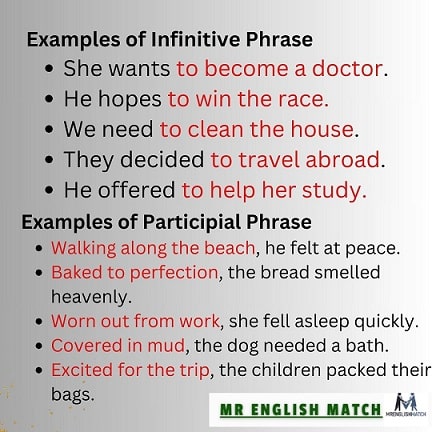
Participial Phrase: Adjective Phrase Using Participles
A participial phrase contains a present or past participle (a verb form that acts as an adjective) along with any modifiers, objects, or complements. This type of phrase functions as an adjective, providing more information about a noun or pronoun. For example, “The woman walking down the street waved at us” uses “walking down the street” as a phrase that describes “the woman.” Participial phrases add descriptive depth to sentences. Another example is “Baked to perfection, the cookies smelled heavenly,” where the phrase describes the cookies.
Moreover in another example, in “The crying baby needed attention,” the phrase “crying baby” describes the baby. If you’re curious about what is a participial phrase or what is a participle phrase, remember that they add descriptive layers and modify nouns with action-related details.
Examples of Participial Phrase
- Walking along the beach, he felt at peace.
- Baked to perfection, the bread smelled heavenly.
- Worn out from work, she fell asleep quickly.
- Covered in mud, the dog needed a bath.
- Excited for the trip, the children packed their bags.
Appositive Phrase: Renames or Describes a Noun
An appositive phrase is a noun or noun phrase that renames or gives additional information about a nearby noun. It provides more context, explanation, or detail. For example, in the sentence “My friend, a talented musician, plays the guitar,” the phrase “a talented musician” gives more detail about “my friend.” Appositive phrases are useful for adding layers of meaning without creating new sentences. Another example is “The insect, a large spider, crawled across the floor.”
Examples of Appositive Phrase
- My friend, a talented musician, played the piano.
- The movie, a thrilling adventure, captivated the audience.
- Our teacher, an expert in math, explained the problem.
- The dog, a loyal companion, wagged its tail.
- Her brother, a skilled painter, sold his artwork.
Why Understanding Types of Phrases Improves Communication

Knowing different types of phrases enhances your ability to communicate fluently and effectively. You can describe people, places, and actions with more accuracy. For instance, using absolute phrases such as “her arms folded across her chest” adds depth to descriptions. Additionally, understanding phrases helps you better comprehend written and spoken English, making everyday interactions smoother.
Consider the impact of using appositive phrases in sentences. An appositive phrase renames or explains the noun it follows. “My friend, Arjun Loke, loves books” gives more context about “my friend.” Similarly, what is a prepositional phrase example? In the sentence, “He sat on the chair,” the phrase “on the chair” gives the location. Phrases and clauses work together to enrich language.
Practical Exercises to Master Types of Phrases
To better understand phrases, try identifying different types of phrases in sample texts. Rewrite sentences by adding verb phrases or replacing simple nouns with noun phrases. For example, you can change “He walked” to “He walked slowly to the door.” Practicing with real-life examples helps improve fluency and comprehension.
Here is a quick list for reference:
| Type of Phrase | Definition | Example |
| Noun Phrase | A noun with modifiers | “The big house” |
| Verb Phrase | Main verb with auxiliaries | “Has been running” |
| Prepositional Phrase | Preposition + object | “On the table” |
| Adjective Phrase | Modifies a noun | “Covered in dust” |
| Adverbial Phrase | Modifies verbs/adjectives/adverbs | “Very quickly” |
| Gerund Phrase | Verb acting as a noun | “Swimming is fun” |
| Infinitive Phrase | “To” + base form of a verb | “To succeed” |
| Participial Phrase | Adjective phrase using participles | “Walking down the street” |
| Appositive Phrase | Renames or describes a noun | “My friend, a musician” |
By exploring what is it called when letters represent a phrase or delving into unique topics like what is a snod in sexual slang phrases, you gain a richer perspective on language’s flexibility. Understanding phrases isn’t just about grammar—it’s about bringing vibrancy and clarity to every conversation.
FAQs
What is a Phrase in English Grammar?
A phrase in English grammar is a group of words that function together as a single unit within a sentence but does not contain a subject-verb combination. Unlike a clause, it does not form a complete idea by itself. For example, in the sentence “She sat by the window,” the prepositional phrase “by the window” gives more information but cannot stand alone as a sentence.
What Are the Types of Phrases in English?
There are several types of phrases in English, each serving a unique role in sentences. Common types include noun phrases, verb phrases, adjective phrases, adverbial phrases, prepositional phrases, gerund phrases, infinitive phrases, participial phrases, appositive phrases, and absolute phrases. These phrases add detail, clarity, and depth to speech and writing.
What is a Noun Phrase?
A noun phrase consists of a noun and its modifiers, such as adjectives, determiners, or other describing words. It functions as a subject, object, or complement within a sentence. For example, “the tall man” is a noun phrase in “The tall man opened the door.”
What is a Verb Phrase?
A verb phrase is made up of the main verb and any auxiliary (helping) verbs that accompany it. For example, in the sentence “She has been reading,” the verb phrase is “has been reading.” Verb phrases can indicate tense, mood, or voice, and mastering them helps improve accuracy in communication.
What is a Prepositional Phrase?
A prepositional phrase starts with a preposition and ends with a noun or pronoun (the object of the preposition), along with any modifiers. An example of a prepositional phrase example is “in the park” in the sentence “The children played in the park.” Prepositional phrases can describe location, time, reason, and more.
What is a Participial Phrase?
A participial phrase begins with a present or past participle (e.g., “running,” “baked”) and acts as an adjective, modifying a noun or pronoun. For example, in “The boy running down the street tripped,” “running down the street” is the participial phrase. Understanding what is a participial phrase or participle phrase helps in enhancing sentence structure.
What is a Gerund Phrase?
A gerund phrase consists of a gerund (a verb ending in -ing used as a noun) and any modifiers or complements. For example, “Swimming in the ocean is relaxing” uses “Swimming in the ocean” as a gerund phrase functioning as the subject. Recognizing what is a gerund phrase can improve your ability to turn actions into nouns.
What is an Appositive Phrase?
An appositive phrase renames or gives more information about a noun or pronoun. For example, in the sentence “My brother, a talented chef, made dinner,” the phrase “a talented chef” is an appositive that describes “my brother.” Mastering what is a appositive phrase adds depth to your writing by providing extra details.
What is an Infinitive Phrase?
An infinitive phrase starts with the word “to” followed by a base verb, along with any modifiers or objects. It often functions as a noun, adjective, or adverb. For example, in “I love to travel,” “to travel” is the infinitive phrase expressing purpose or intent.
What is It Called When Letters Represent a Phrase?
When letters represent a phrase, it is often called an acronym or abbreviation. Acronyms form by taking the initial letters of each word in a phrase and combining them, such as “NASA” for “National Aeronautics and Space Administration.” Understanding the use of such forms can enhance both spoken and written communication.
What is a Signal Phrase?
A signal phrase introduces a quote, paraphrase, or piece of evidence within writing. It often includes the speaker’s or author’s name and a verb related to communication, such as “says,” “writes,” or “argues.” For example, “According to Dr. Smith, ‘Exercise improves mental health.’” Signal phrases help provide context and indicate the source of information in writing.
What is a Two-Word Phrase?
A two-word phrase consists of just two words that function together to convey meaning. Examples include “good morning,” “run fast,” and “feel better.” What is a 2-word phrase is often asked because these concise expressions are common in everyday speech and can convey a range of meanings with minimal words.
What is a Verbal Phrase?
A verbal phrase includes a verb form (gerund, participle, or infinitive) and any modifiers or objects. It can function as a noun, adjective, or adverb. For example, in the phrase “Eating too much candy can be harmful,” “eating too much candy” is a verbal phrase acting as a subject. Recognizing what is a verbal phrase helps clarify sentence roles.
What is a Nominal Phrase?
A nominal phrase, or noun phrase, centers around a noun and includes its modifiers. The phrase “a bouquet of flowers” serves as a nominal phrase in “She bought a bouquet of flowers.” These phrases add descriptive detail and help clarify meaning in sentences.
What is an Absolute Phrase?
An absolute phrase modifies an entire sentence, providing context or background information. It typically consists of a noun and a participle. For example, in “Her voice trembling, she delivered the speech,” “Her voice trembling” is the absolute phrase. Absolute phrases can add vivid imagery and detail to writing, enhancing the overall narrative.
Conclusion
Understanding the types of phrases in English is crucial for enhancing both written and spoken communication. Each phrase—from prepositional phrases that give more detail about relationships, locations, or time, to participial phrases that bring life to descriptions—plays a unique role in creating clearer and more engaging language. Whether it’s using noun phrases to specify subjects, verb phrases to indicate actions, or appositive phrases to provide context, mastering phrases makes your speech and writing more precise and vivid. By learning how phrases function and incorporating them skillfully, you can transform simple sentences into more dynamic, meaningful expressions that capture attention and convey your ideas effectively.


